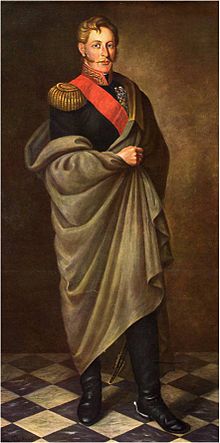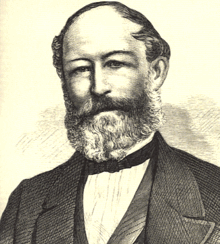- Otto Philipp Braun
-
Otto Philipp Braun (called also: Felipe Braun). Born 13 December 1798 in Kassel, Principality of Hessen-Kassel (today Germany). Died on 24 July 1869 in Kassel, a province of the kingdom of Prussia. Braun was one of the most successful foreign volunteers participating in the independence war of South America. He was an important supporter of Simon Bolívar and Antonio José de Sucre and later of Andrés de Santa Cruz. In 1838 Braun was awarded the title “Great Marshal of Montenegro” being Bolivias only Great Marshal and South Americas only foreign Marshal until today.
Contents
Early life
Braun went to school in Kassel until he joined the volunteer brigade of the horseback rangers of the kingdom of Hessen-Kassel in 1814 in order to fight against the troops of Napoleon. Afterwards Braun went to Hannover where he studied veterinary medicine. He continued his studies at the University of Göttingen.
In 1818 Braun left crisis-ridden Europe and emigrated to the United States. There he failed to establish himself as a veterinary. His stay on Haiti as the official horse instructor of King Henri Christophe ended also without the desired long term contract.
Military life
Liberation of South America
Therefore he joined the army of Simón Bolívar in the midyear of 1820 as a low ranking officer. Felipe Braun, as he was called from then on, participated in the campaigns of Colombia and the Battle of Carabobo in Venezuela. He joined the Guard of Simón Bolívar in 1821 and accompanied him on his Campaign to liberate today’s Ecuador and Peru as one of his many officers.
On August 6, 1824 Braun was the first patriotic soldier to set foot on the plain of Junín, where a superior cavalry force of the royalistic-Spanish army of José de Canterac was waiting. Due to Braun's unusual conduct and over the years highly trained and well disciplined units, the patriotic cavalry not only resisted the superiority but was able to defeat their opponent. Braun was promoted and belonged from then on to the intimate circle around Simón Bolívar and Antonio José de Sucre.
With the latter Braun participated in the liberation of “Alto Peru” (later Republic of Bolivia). During his time in Bolivia (1825–1828) Braun served the Bolivian President Antonio José de Sucre loyal. After uprisings in Cochabamba and La Paz which parts of the unit Braun commanded participated, he fell in disgrace. This changed fundamentally when Braun withstood other attempts and bravely attacked the Peruvian invasion of Bolivia of 1828 under general Agustín Gamarra.
Revolutionary aftermath
In the Peruvian-Colombian war of 1828/29 Braun fought on the side of Simón Bolívar, Antonio José de Sucre and Juan José Flores. After a failed diplomatic mission as official representative of the victors Braun had to flee ending up in Valparaíso, Chile (1829). A few months later Braun was able to travel to Arequipa, Peru, where finally met his wife Justa Germana de Rivero y Abrill, which he had married through written authority in 1828.
In Arequipa Braun spend almost a year until the Bolivian president Andrés de Santa Cruz asked Braun to join his new administration. Braun accepted and moved to Bolivia. From 1830 until 1839 Braun became one of the most successful generals in Bolivian history. Furthermore Braun became a very valuable adviser of President Santa Cruz. Latter made him Prefect, entrusted whole armies, let him command battles and gave him the responsibility of the ministry of defense. During the Peru-Bolivian Confederation (1836–1839) Braun served Santa Cruz loyal. After Braun triumphed in the battle of Montenegro against a Argentinean invasion in June 1838 Santa Cruz awarded Braun with the Title: Great Marshal of Montenegro. Until today Braun is the only foreigner ever to have gained this title in South America and the only marshal of Bolivia at all.[1]
After Santa Cruz lost the Battle of Yungay in January 1839 against a Peruvian-Chilean Invasion his confederation collapsed due to a revolution led by José Ballivián and José Miguel de Velasco, Braun fell too. He had to leave Bolivia and headed back to Europe. Until today the knowledge about his life after his fall remains uncertain.
Later years
In 1861 after numerous transatlantic travels between Europe and South America Braun left the continent forever. Eight years later Braun died in Bad Wildungen. He was put to rest in his near hometown Kassel. Dozens of newspapers in Europe and South America remembered the contribution Otto Philipp Braun made to the independence of South America as well as to the construction of the Republic of Bolivia.
References
- Robin Kiera: Der große Sohn der Stadt Kassel? Der Großmarschall Otto Philipp Braun als Symbol lokaler Geschichtspolitik, Kassel 2009.
- Wilfried Nölle: La vida de Otto Felipe Braun, Gran Mariscal de Montenegro, a través de cartas y documentos de la épocha, expuesta por Wilfried Noelle. La Paz 1969.
- Julio Diaz: El Gran Mariscal de Montenegro, Otto Felipe Braun, ilustre extranjero al servico de Bolivia, 1798–1969. La Paz 1945.
Notes
- ^ Robin Kiera: Der große Sohn der Stadt Kassel? Der Großmarschall Otto Philipp Braun als Symbol lokaler Geschichtspolitik, Kassel 2009, page 28ff
Categories:- 1798 births
- 1869 deaths
- Bolivian military personnel
- People of the War of the Confederation
Wikimedia Foundation. 2010.


